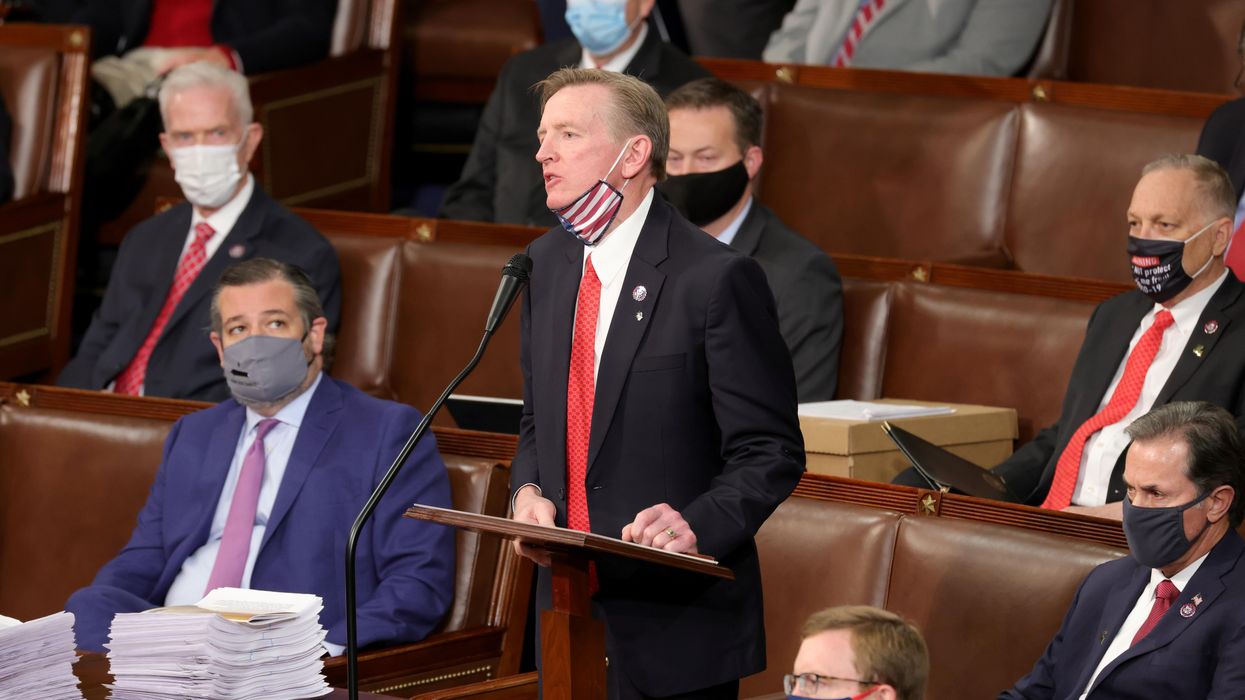Levine is an elections integrity fellow at the Alliance for Securing Democracy, which develops strategies to deter and defend against autocratic efforts to interfere in democratic institutions.
Should members of Congress be able to object to election results as part of a strategy to draw greater attention to election reform efforts, as two Democratic members tried to do following George W. Bush’s reelection in 2004?
Should members of Congress be able to object to election results on the basis of spurious allegations of election fraud, as some Republicans sought to do following the 2020 presidential election?
If the answer to each of the above is no, then the surest way to avoid repeating the aforementioned scenarios, while also ensuring that future presidential elections remain free and fair, is for the House and Senate to reform the Electoral Count Act, the poorly written 1887 statute governing how Congress counts electoral votes, before the end of the current lame-duck session.
As Republican Sen. Susan Collins of Maine, who helped lead efforts to draft ECA reform legislation over the summer, recently noted, “[The Electoral Count Reform and Presidential Transition Improvement Act] has to pass before the end of the year. We cannot leave these issues that are so important unresolved as we begin a presidential election cycle.” While much of the coverage around the midterms has understandably centered around election-denying candidate who lost their own elections, their ranks will actually grow in the next Congress, both in the House and Senate. The need to pass ECA reform has therefore not dissipated, if anything it has grown more urgent. While the Senate and the House versions of the legislation have similarities and differences, here are key areas that both bills address and that Congress should sort out to ensure the will of the voters continues to be respected in future presidential elections.
1. Increase the threshold for congressional objections. The ECA currently allows for objections to Congress counting a state’s electoral votes if the objections are in writing and signed by at least one senator and one representative. In 2005, two members in a body of 535 delayed the certification of presidential election results. In 2021, just seven senators lodged an objection to the certification of presidential election results (along with many House members). Changing the ECA to require that more members in both chambers are needed to object to election results would reduce the likelihood of frivolous objections (and objectors) gumming up the casting and counting of electoral votes.
2. Clarify the vice president’s role. As former Vice President Mike Pence and countless others have noted, there is little, if any, support in the current version of the Electoral Count Act, the 12th Amendment, or elsewhere for the proposition that the vice president has discretion over which electoral votes to count. Unfortunately, that hasn’t stopped presidential legal advisors, elected officials and others from suggesting otherwise, which contributed to Pence being targeted by insurrectionists on Jan. 6, 2021. Making it crystal clear that the vice president’s role in the counting of electoral votes is ministerial, and that s/he has no role to play in adjudicating disputes over electors, could help prevent future vice presidents from being targeted in a similar manner, while also ensuring that they adopt a similar “small d” democratic stance on their role in the casting and counting of electoral votes.
3. Address “failed” elections. Under the ECA, if a state conducts an election but somehow “failed to make a choice” on Election Day, then the state legislature may subsequently decide the manner in which electors are appointed. Such flexibility was meant to accommodate extraordinary circumstances like severe inclement weather conditions that could interfere with the successful administration of an election. Unfortunately, “failed election” is not defined in the law, and some partisan actors have more recently sought to exploit this vulnerability to suggest that more minor occurrences such as delays in counting votes can form the basis of a “failed election” that necessitates legislatures appointing electors themselves after Election Day.
Congress should get rid of the concept of a failed election so that legislatures cannot simply invalidate an election for any reason, such as voting glitches that do not disenfranchise voters, and specify the extraordinary circumstances under which an election result can be set aside, to ensure that the democratic process is not compromised on account of catastrophic occurrences such as a military invasion or a severe inclement weather event.
4.Ide ntifying the correct electors. The Electoral Count Act’s “safe harbor” provision provides that when a state resolves disputes to laws in place prior to Election Day, and does so by a certain date, the state’s final determination is to be treated as “ conclusive ” by Congress. However, the law lacks teeth to ensure that Congress respects a state’s election results, and the language in the ECA allowing Congress to justify objecting state results is lacking, to put it mildly.
Congress could go a long way toward addressing these issues by: 1) updating the ECA to identify a single person in each state responsible for submitting the conclusive slate of electors; 2) providing presidential candidates a clear path for seeking judicial review of claims related to a state’s certificate of ascertainment identifying its electors; and 3) clarifying its role in reviewing slates of electors submitted by a state’s representative pursuant to court judgments. These changes would reduce the likelihood of multiple state officials sending Congress different slates, ensure that challenges to presidential election results occur in a timely manner, and increase the likelihood that presidential election disputes are decided in a manner that is dictated by law, not politics.
In the 2022 midterms, voters made clear that they wanted governors and secretaries of state who were willing to put the impartial administration of elections ahead of any partisan interests. Congress could demonstrate similar resolve by passing ECA reform during the lame-duck session.




















Trump & Hegseth gave Mark Kelly a huge 2028 gift